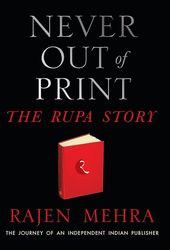It is a freezing day in Delhi’s winter that has outlived its novelty. The door of the Rupa office in the chaotic grey of Yusuf Sarai, with endless rows of shops, opens and music from the newly opened coffee shop wafts in.
Rajen Mehra arrives right on time. “I am actually two minutes early,”he says. At 77, Mehra is spry, with the restless energy of a self-made man. At 22, Mehra travelled across India on a train to learn about publishing, a journey that changed his life. He was waiting to join a management school, but the train journey from then Calcutta to Kerala taught him much more than he would ever learn in books. He would, however, sell them.
Never Out of Print is a memoir of not just a man but also Rupa Publications and the growth of Indian publishing. This book or the idea of it started when he was in hospital for severe breathlessness in 2010. When he got home, he wrote. He first faced rejection from a friend, till the book emerged in this form―breezy, interspersed with pictures, memories and vignettes of his life.
His great-grandmother had told his granduncle, who started Rupa, that if his first customer was a Muslim, his business would thrive. As it happened, the man who stopped to buy the Collins English Dictionary on August 17, 1936, at his stall was Humayun Kabir. “At auspicious occasions, I will always invite a Muslim to do that,” says Mehra. “People get upset about it. What is to get upset about? They are humans, we are humans.”
Mehra recounts the journey of Rupa from its Kolkata home near the coffee house to Delhi. The coffee house was where the city’s brightest gathered for adda. Mehra once got a cigarette for Kanu Sanyal, founder-member of the naxalite movement: “He paid for it,”says Mehra, smiling. Satyajit Ray, another visitor to the coffee house, designed the first Rupa logo.
Rupa has now become a much-established name in India’s thriving publishing scene under Mehra. It moved from being the distributor for giants like Penguin and HarperCollins to publishing. “We expanded into nonfiction, and nonfiction in an area Penguin would not get into and not get, like food,” he says. Over the years, this expanded to include big politicians like L.K. Advani to cricketers like Sunil Gavaskar―each of them having been scouted by Mehra.
“I shot the picture for the cover for [Gavaskar’s] second book, Idols,” says Mehra. “We had no budget. The company was going through the traumatic effect of leaving Calcutta. Photographers were not willing. Once they heard it was Sunil, they wanted to charge Rs10,000. So I took him to the DGCA ground and he was practising and I took some photos.”
The story of Salman Rushdie’s Satanic Verses is well known. But Mehra has his own. “The manuscript was with Penguin and they gave it to me to read,” he says. “They were worried about some passages in the book. I gave it to two of my trusted Muslims; they were highly literate people. They said there is nothing in this.” So Rupa imported 500 copies. “The next day, (journalist and newsreader) Tejeshwar Singh called to say, ‘The book may be banned.’ Our office was in the Jama Masjid area. He was very concerned. I said, ‘We will see what happens.’ At 9pm, I was listening to the news. And Tejeshwar announced the book was banned.”
The next day, Mehra got to office early. “I used to drive an Ambassador car, and I put all my stocks into the car,” he recalls. “The first call came at 9am. Mr Sham Lal, editor of the Times of India, wanted five copies.” By the end of the evening, 400 copies were sold. “I had ordered 10,000 copies with special permission to import. But it had to be stopped at Heathrow,” he says.
Everything Mehra has learnt is through grit, hard work and enterprise. “Publishing takes years to build,” he says. “It is very difficult to destroy, because if you have good literature, you cannot destroy it.”
NEVER OUT OF PRINT: THE RUPA STORY: THE JOURNEY OF AN INDEPENDENT INDIAN PUBLISHER
Author: Rajen Mehra
Publisher: Rupa Publications
Pages: 504; price: Rs500



